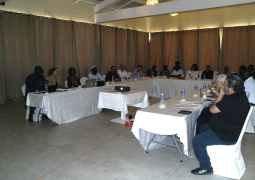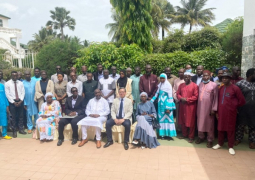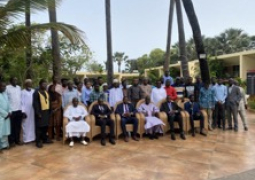
The event was aimed at addressing climate change challenges holistically by enhancing governance structures in implementing practical initiatives on the ground and strengthening institutional capacity with technical experts from all sectors.
By convening stakeholders from various sectors and levels of governance, the workshop sought to foster collaboration, knowledge-sharing, and consensus-building on climate action strategies. The pilot project aims to demonstrate the feasibility and effectiveness of integrating solar PV systems and forest conservation measures as part of climate change mitigation and adaptation efforts.
Welcoming the participants, Mr. Babucarr Zaidi Jallow, deputy Permanent Secretary at the Ministry, while recognising the crucial role in shaping the nation's climate resilience and sustainable development, also acknowledged the importance of collective commitment in tackling environmental challenges.
He highlighted the significance of each individual's contribution towards achieving common goals.
DPS Jallow revealed that this would offer a coordinated approach to tackling climate challenges across governance levels, promoting collaboration among stakeholders.
This framework, he added, encourages partnerships between government, private sectors, NGOs, CSO, CBO and academia, enhancing the efficiency of climate initiatives through resource pooling.
Mr. Jallow also underscored the importance of Monitoring, Reporting, and Verification (MRV) in successful climate governance and described the gathering as a platform for knowledge exchange and capacity building.
He urged active engagement from the Communities of Practice to leverage MLCG's potential for national development and community well-being.
Also, the second day of the workshop witnessed discussion on ways of strengthening the Solar PV and Forest Degradation Pilot Project in The Gambia. Participants shared their expertise and experiences, identified challenges, and evaluated complementary methods to strengthen these transformative pilots.
A special highlight was the presence of the chairperson of the National Assembly Select Committee on Environment, Sustainable Development and NGOs Affairs, Hon. Yahya Gassama.
He stated that climate change poses significant challenges to The Gambia, affecting its environment, economy, and society. Rising temperatures, erratic rainfall patterns, and deforestation are among the key climate-related issues impacting the country.
In response to these challenges, there is a pressing need for coordinated efforts to strengthen climate governance and implement sustainable solutions. The integration of renewable energy sources such as solar photovoltaic (PV) systems would contribute to mitigating climate change while addressing energy access issues. Combating forest degradation through pilot projects will help preserve biodiversity and enhance resilience to climate impacts.





